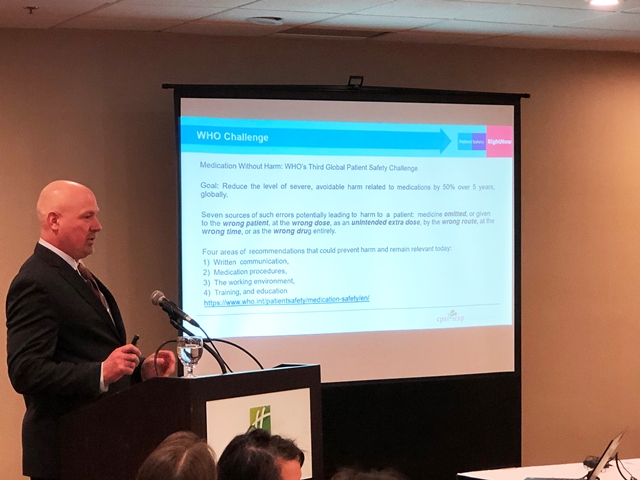
By Virginia Flintoft
#ConquerSilence is a campaign led by the Canadian Patient Safety Institute to catch mistakes before they happen. We want people in Canada to know that if something looks wrong, feels wrong, or is wrong – they need to speak up.
One in three Canadians has suffered from preventable healthcare harm, and yet collectively most people are unaware that the problem exists. This is a silent epidemic. The silence forms a barrier between patients and providers, between colleagues in healthcare facilities, between administrators in different regions, and between the public and policymakers. If we do nothing, 1.2 million Canadians will die from preventable patient harm in the next 30 years.2 We can battle systemic silence in our efforts to reduce patient harm together.
In Canada, harmful incidents associated with medications are among the most frequent cause of patient safety incidents. The 5 Questions to Ask About Your Medications is one tool that healthcare providers are using to help patients and advocates speak up. The Canadian Patient Safety Institute teamed up with the Institute for Safe Medication Practices Canada, Patients for Patient Safety Canada, the Canadian Pharmacists Association, and the Canadian Society for Hospital Pharmacists to create a list of top questions to help patients and their caregivers have a conversation about medications with their healthcare provider. When care providers change, doses change, or medications change, those are signals to speak up and ask questions. The 5 Questions tool is available in 25 different languages.
In early 2019, the Canadian Patient Safety Institute launched an 18-month Safety Improvement Project to address medication safety at transitions of care for frail, elderly populations. Five teams are participating in the collaborative, two from ambulatory care and three from acute inpatient care settings, including: British Columbia First Nations Health Authority (Klemtu, BC); Cancer Care Manitoba; the University Health Network (Toronto, ON); Niagara Health System (St. Catharine’s site); and Middlesex-London Health Unit (Strathroy Hospital site).
Each team is approaching their safety improvement project differently, with the common goal of reducing harm. The teams have developed aim statements, are implementing interventions, and monitoring data to assess their progress in achieving their goals. The process is guided by a quality improvement/knowledge translation learning design. The teams will report back on their projects and share their learnings in April 2020.
To date, the work has resulted in system changes to improve patient flow and standardized medication reviews. Medication reconciliation practices are being incorporated into the improvement projects. Some innovative changes are being introduced, such as pharmacists doing routine follow-up with patients for up to three months, and fabric bags for medications and supplements given to every patient so that a medication review can be completed with the hospital pharmacist. The 5 Questions tool is also being used by providers as an education tool to help patients speak up about their medications.
For more information or to speak up for medication safety, visit www.conquersilence.ca
Virginia Flintoft, Senior Project Manager, Canadian Patient Safety Institute leads the Medication Safety at Transitions of Care Safety Improvement Project.

